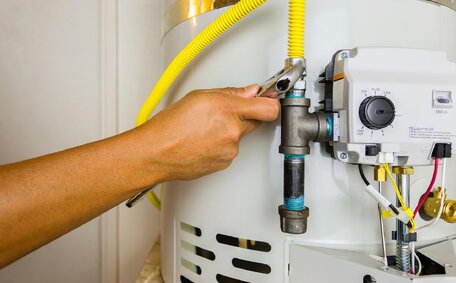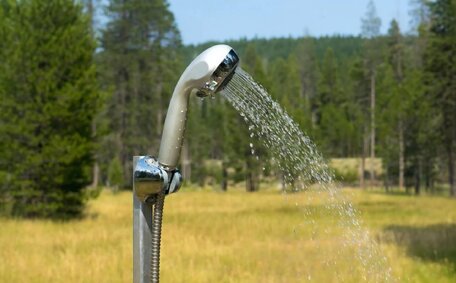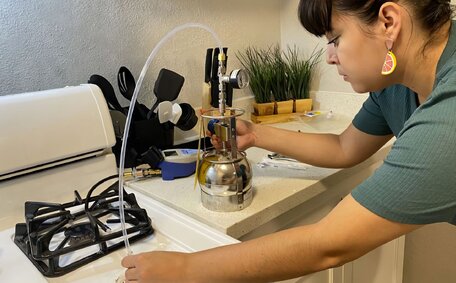Causes Of Blocked Drains
There are several common causes of blocked drains that can lead to serious plumbing issues if left untreated. Some of the most frequent culprits include:
- Hair - Strands of hair that get washed down the drain can catch on pipe joints and accumulate over time, forming a dense plug.
- Food waste - Food scraps like oil, grease, and small pieces of food can stick to pipe walls and cause a clog.
- Tree roots - Roots from trees and shrubs near your home can grow into drains seeking water. The roots can totally block drainage pipes.
- Buildup of waste - Everyday items like soap scum, toothpaste, and other debris can slowly build up on pipe walls and create a blockage.
- Foreign objects - Flushing inappropriate items like diapers, sanitary products, and wet wipes down the toilet can get stuck in drains.
- Pipe damage - Cracks, breaks, misalignments, and sagging in drainage pipes allow solids to catch and accumulate.
A blocked drain prevents wastewater and sewage from properly flowing out of your home. It’s crucial to address any blocked drains issues promptly to keep your plumbing system operating smoothly.
Left unattended, blocked drains can back up sewage into your home, flood your property, produce foul odours, lead to water damage, and result in expensive repairs.
Signs You Have A Clogged Drain
There are several telltale signs that indicate you may have a clogged drain in your home:
- Water draining very slowly or not at all from sinks, tubs, or showers
- Gurgling sounds coming from drains
- Sinks, showers, and tubs that don’t fully drain
- Toilets that flush sluggishly or back up
- Foul sewage odours coming from drains
- Pools of standing water around floor drains
- Leaking water around sinks, tubs, and shower stalls
- Low water pressure throughout your home’s plumbing system
A clogged drain prevents wastewater from properly flowing out of your home.
Left unaddressed, a blocked drain can back up sewage into your property, cause flooding, produce horrible smells, and lead to costly plumbing repairs and water damage. Left unaddressed, a blocked drain can back up sewage into your property, cause flooding, produce horrible smells, and lead to costly plumbing repairs and water damage.
Health Risks From Neglected Drains
Neglected and clogged drains can pose serious health risks. When drains are blocked, sewage and wastewater can back up into your home. This backflow allows disease-causing bacteria, viruses, and mould to breed in stagnant water.
Sewage backup allows raw sewage containing E. coli, Salmonella, Giardia, and other harmful microbes to contaminate your home. These bacteria can lead to severe gastrointestinal infections marked by nausea, vomiting, diarrhoea, and fever if you come into contact with contaminated water.
Mould spores also thrive in the damp, stagnant conditions caused by a clogged drain. Exposure to mould can trigger allergic reactions, asthma attacks, and other respiratory problems. Certain moulds like Black Mould release mycotoxins that can suppress immune function.
The foul, decaying odours from a blocked drain may also indicate a sewer gas leak. The foul, decaying odours from a blocked drain may also indicate a sewer gas leak.
Young children and the elderly are most susceptible to illnesses caused by sewage contamination and mould growth resulting from a neglected clogged drain.
A functioning drainage system helps remove disease-causing microbes and harmful gases from your home. Ignoring a clogged drain allows these threats to your health and home to proliferate. Always contact a professional plumber promptly if you suspect a drain blockage.
Sewage Backup
Sewage backup occurs when wastewater and sewage draining from your home’s plumbing fixtures are unable to properly flow out through the drainage pipes. This leads to the wastewater backing up into your property through sinks, toilets, shower and tub drains, floor drains, and more.
There are several common causes of sewage backup into your home:
- Tree roots infiltrating and choking off drainage pipes
- A main sewer line clog or blockage
- Collapsed, cracked, or broken drain pipes
- Grease or waste buildup forming a clog
- A blockage farther down your street’s sewer line
When your drains are clogged and wastewater can’t exit your home, it backs up into sinks, bathtubs, toilets, and basements. Raw sewage overflowing into your home can cause:
- Risks of coming into contact with bacteria and viruses
- An extremely foul odour throughout the home
- Flooding that can damage walls, floors, and possessions
- Mould growth
- Ruined plumbing fixtures and pipes
It is crucial you contact an emergency plumber immediately if you experience a sewage backup into your home. Ignoring a sewage backup will allow for continued flooding of your property and exposure to human waste, harmful microbes, and destructive mould growth.
They can determine the exact location of the clog or blockage and take prompt action to fully clear your drains and prevent the further backflow of contaminated wastewater.
Property Damage
Ignoring a blocked drain can lead to extensive and costly property damage. Backed up sewage and wastewater can cause flooding in basements and crawl spaces. Standing water also leads to foul odours permeating through your home.
This water can warp wooden structural elements, cause drywall and insulation to deteriorate, and encourage mould growth.
The added pressure in clogged drain pipes may also cause them to burst or crack over time. Continued use of a severely clogged drain may require full pipe relining or replacement.
This can lead to water damage across ceilings, floors, carpets, and furnishings. Rust, corrosion, and leaks can develop in pipes.
If the wastewater backup is significant, the weight and pressure can shift your home’s foundation leading to serious structural issues. Blocked drains can also attract rodents and insects that can chew through walls or floorboards weakening the integrity of your home.
The costs to repair property damage from neglected drains often reaches into the tens of thousands of dollars. Water mitigation, mould remediation, structural repairs, flooring replacement, drywall installation, and repainting add up quickly. Avoiding these expenses requires having any blocked drains promptly cleared by a professional plumber.
Flooding
Blocked drains can lead to serious flooding issues if left unattended. When your drains are clogged with grease, hair, debris and other material, water cannot properly drain out of sinks, tubs, and toilets.
This causes water to back up and overflow from fixtures. Over time, continued overflow can lead to standing water flooding basements, crawl spaces, and other low-lying areas of your home. Flooded areas allow for toxic mould growth and damage to walls, floors, insulation, and foundations.
If the incoming waste water has no where to go, it can come back up through floor drains, shower drains, and toilets. Raw sewage overflowing into your home is a dangerous health hazard and can spread harmful bacteria.
A drain blockage on your property or in the city sewer mains can also cause storm water to back up into your plumbing. Heavy rains cannot dissipate, and instead flood into your home. This flood water contains debris, chemicals, and sewage.
Routine drain maintenance and prompt attention at the first sign of a clog are crucial. A plumber can use specialised drain cleaning equipment to clear blockages before flooding occurs. Regular drain care also helps prevent clogged drains which left unaddressed can seriously flood your home.
Costly Repairs
Ignoring a blocked drain can result in expensive plumbing repairs. As clogged drains cause continued backups, flooding, and sewage overflow, extensive repairs to your plumbing system may be needed.
To fix burst pipes or fully clear major blockages in drainage lines, plumbers may need to excavate around your home’s exterior to gain access. This requires jackhammering through concrete and extensive landscaping repairs.
Replacing sections of damaged pipes, clearing tree roots, and installing cleanouts to improve drain access can cost thousands. Full sewer line replacement often exceeds $10,000.
Indoor repairs like replacing water-logged drywall, insulation, flooring materials and cabinets due to flooding also drive up costs. Mould remediation requires drying out areas thoroughly and extensive scrubbing and disinfecting.
Regular drain maintenance like using enzyme cleaners monthly, avoiding grease buildup, and having drains professionally cleared yearly is far more affordable than emergency repairs for neglected drains. Addressing problems early is key to prevent expensive solutions.
Preventing Blocked Drains
There are several effective ways to help prevent clogged and blocked drains in your home:
- Use drain strainers in sinks to catch hair and food debris before it goes down the drain.
- Run hot water down drains for a minute or two after use to clear grease and soap buildup.
- Pour a pot of boiling water mixed with baking soda and vinegar down drains monthly to break up sludge.
- Avoid pouring fats, oils, and grease down the sink - collect in a jar and dispose in the trash.
- Only flush toilet paper down toilets - never flush wipes or feminine products.
- Have older sewer lines professionally inspected for cracks or root infiltration.
- Don’t use harsh drain cleaners which can damage pipes - try an enzyme cleaner instead.
- Hire a plumber to perform preventative drain cleaning to keep pipes clear.
Staying on top of drain maintenance and using best practises for what goes down drains will help minimise the risk of expensive, damaging clogged drains in your plumbing system.
When To Call A Professional
p>p>p>p>p>p>p>p>p>p>p>p>p>p>p>






